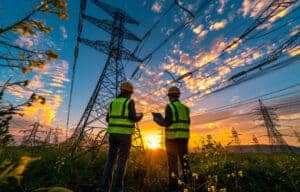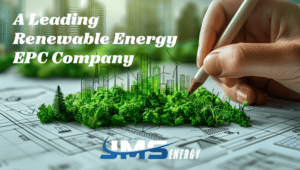
Table of Contents
Introduction
To ensure the successful implementation of solar projects, the Solar EPC (Engineering, Procurement, and Construction) model is widely adopted. Solar energy continues to gain momentum as one of the most promising renewable energy sources. This approach centralizes the project management, design, procurement, and installation processes under a single contractor. By understanding what Solar EPC involves, stakeholders can make informed decisions that maximize efficiency, quality, and cost-effectiveness. For companies like JMS Energy, Solar EPC is an essential part of the journey toward a sustainable energy future.

What is Solar EPC?
The term Solar EPC represents a model where one company, known as the EPC contractor, is responsible for managing the entire process of a solar energy project. The acronym EPC stands for Engineering, Procurement, and Construction, encapsulating the three core phases of solar project development.
Under the EPC model, a single contractor handles every aspect of the project, from initial site assessment and system design to procurement of materials and equipment, as well as the final installation and commissioning of the solar power system. This approach offers a streamlined and efficient way to ensure all project components align, with minimal disruption and maximum accountability. By centralizing these responsibilities, the EPC model minimizes risks, simplifies project timelines, and often results in cost savings for project developers.
Comparison to Other Models
Solar EPC is often preferred over other models, such as the design-bid-build approach, where separate contractors handle design, procurement, and construction. Unlike the design-bid-build model, which involves multiple contracts and points of responsibility, the EPC model provides a single point of contact throughout the project lifecycle. This means fewer chances for miscommunication, better coordination, and enhanced accountability, making Solar EPC an attractive choice for both commercial and large-scale solar installations.
Components of Solar EPC
Solar EPC encompasses three distinct but interconnected stages: Engineering, Procurement, and Construction. Here’s a closer look at each component:
- Engineering:
- The engineering phase is the foundation of a successful solar project. This stage involves a comprehensive assessment of the project site, including feasibility studies, environmental impact analyses, and system layout designs.
- Engineering tasks include the creation of electrical and mechanical designs that ensure the solar installation operates efficiently and meets regulatory requirements. Engineering also involves the integration of solar panels, inverters, and other system components to create a cohesive and effective energy solution.
- With the engineering team’s expertise, JMS Energy can tailor each solar installation to the site’s unique needs, optimizing performance while adhering to safety standards.
- Procurement:
- During the procurement phase, the EPC contractor sources all the equipment, materials, and services necessary for the project. This stage is crucial, as it directly influences the quality and longevity of the solar installation.
- Procurement includes purchasing solar panels, inverters, mounting structures, and electrical components. An effective procurement strategy prioritizes both quality and cost-effectiveness, ensuring that only reliable, high-performance equipment is used.
- JMS Energy leverages its industry connections and expertise to select the best suppliers, securing top-quality materials at competitive prices. Proper procurement also helps minimize project delays by ensuring timely delivery of materials.
- Construction:
- The construction phase involves the actual installation of the solar power system. Site preparation, foundation work, mounting, and wiring are all part of this stage. The EPC contractor manages all construction activities to ensure that the installation meets the specifications developed during the engineering phase.
- Safety and quality control are paramount during construction, as even minor errors can impact the system’s long-term efficiency. Quality assurance measures, such as regular inspections and adherence to industry standards, are essential to successful project completion.
- JMS Energy’s experienced construction teams prioritize on-time, on-budget project delivery, while maintaining a high level of workmanship. The construction phase concludes with system testing and commissioning, ensuring the solar installation is fully operational.
Advantages of the Solar EPC Model
Choosing the Solar EPC model offers several advantages:
- Streamlined Process: By managing engineering, procurement, and construction under one contract, the EPC model simplifies project management. Stakeholders benefit from a single point of responsibility, reducing the complexity of coordinating multiple contractors.
- Cost Management: Many EPC contracts use a fixed-price structure, which helps project owners control costs by setting an upfront price. This minimizes the risk of unexpected expenses and helps ensure the project stays within budget.
- Enhanced Accountability: With an EPC contractor overseeing the entire project, accountability is clear. If any issues arise, there is no ambiguity about who is responsible. This reduces conflicts and ensures the contractor is fully invested in delivering a successful project.
- Quality Assurance: Since the EPC contractor is responsible for the project from start to finish, there is a strong incentive to maintain high quality throughout the process. JMS Energy’s commitment to excellence ensures that each phase of the Solar EPC process meets industry standards.
Why Solar EPC is Ideal for Large-Scale Projects
Solar EPC is particularly well-suited to large-scale solar installations, such as commercial and industrial projects. For companies like JMS Energy, managing and delivering extensive solar projects requires a coordinated and efficient approach. The EPC model provides this by consolidating all necessary services into a cohesive process, allowing large projects to proceed smoothly and reliably.
Scalability and Future Growth
As renewable energy demand grows, Solar EPC is likely to remain a vital part of the industry’s expansion. Its scalability makes it ideal for not only today’s large projects but also future advancements in solar technology. By choosing JMS Energy as their Solar EPC partner, clients are investing in a company that understands the nuances of solar power and is equipped to handle projects of any size.
Challenges in Solar EPC Projects
While Solar EPC offers numerous benefits, there are some challenges to consider:
- Site and Environmental Concerns: Finding suitable land for solar installations can be difficult, particularly in densely populated areas. Environmental assessments and permits are necessary to ensure the project complies with local regulations.
- Supply Chain Dependencies: Procurement can be affected by supply chain delays or shortages. JMS Energy’s established relationships with suppliers help mitigate this risk, but global factors can impact material availability.
- Technological Adaptation: As solar technology evolves, EPC contractors must stay current with the latest advancements. This is crucial for delivering systems that are not only efficient today but will also remain viable in the future.
- Quality Control: Maintaining consistent quality throughout the project requires rigorous oversight. JMS Energy adheres to strict quality standards to ensure each installation operates reliably over its lifespan.
Choosing the Right Solar EPC Partner
Selecting a trustworthy and experienced EPC contractor is essential for solar project success. When evaluating potential EPC partners, consider factors such as:
- Industry Experience: Look for an EPC contractor with a proven track record in solar projects.
- Project Portfolio: Review the company’s portfolio to ensure they have experience with similar projects.
- Commitment to Quality: Quality assurance measures and adherence to industry standards are key indicators of a reliable EPC contractor.
JMS Energy meets all these criteria, with a commitment to excellence and a history of successful solar installations. By choosing JMS Energy as their Solar EPC partner, clients benefit from a team dedicated to delivering high-quality, sustainable energy solutions.
FAQ Section
1. What does EPC stand for in solar energy?
EPC stands for Engineering, Procurement, and Construction. It’s a project delivery model that oversees the solar installation process from design through to completion.
2. What are the benefits of using an EPC contractor for a solar project?
An EPC contractor streamlines the process, offers cost management, ensures accountability, and provides a single point of responsibility, making the project more efficient and cost-effective.
3. How long does a typical solar EPC project take?
The timeline depends on project size, site conditions, and permitting, but most large-scale projects take several months to over a year to complete.
4. What factors influence the cost of a Solar EPC project?
Cost factors include the installation size, quality of equipment, labor costs, and site-specific challenges.
5. Is Solar EPC suitable for both residential and commercial projects?
While it’s commonly used for commercial and industrial projects, residential projects can also benefit from the EPC approach, particularly for larger installations.
Conclusion
Solar EPC, encompassing Engineering, Procurement, and Construction, plays a pivotal role in bringing solar energy projects from concept to reality. By managing all stages of the project lifecycle under one umbrella, EPC contractors streamline the process, enhance accountability, and help control costs, making the entire experience more efficient and reliable. For companies like JMS Energy, a trusted Solar EPC provider, this approach means delivering high-quality, large-scale renewable energy solutions that are tailored to meet each client’s unique needs.
As the world increasingly shifts towards clean energy, Solar EPC continues to be instrumental in meeting sustainability goals, reducing carbon footprints, and creating a more resilient energy future. By choosing JMS Energy as your Solar EPC partner, you’re not only investing in a sustainable project but also benefiting from the expertise, reliability, and commitment to quality that JMS Energy brings to every project. Together, we can build a cleaner, brighter future powered by solar energy.
Follow us on Linkedin.




